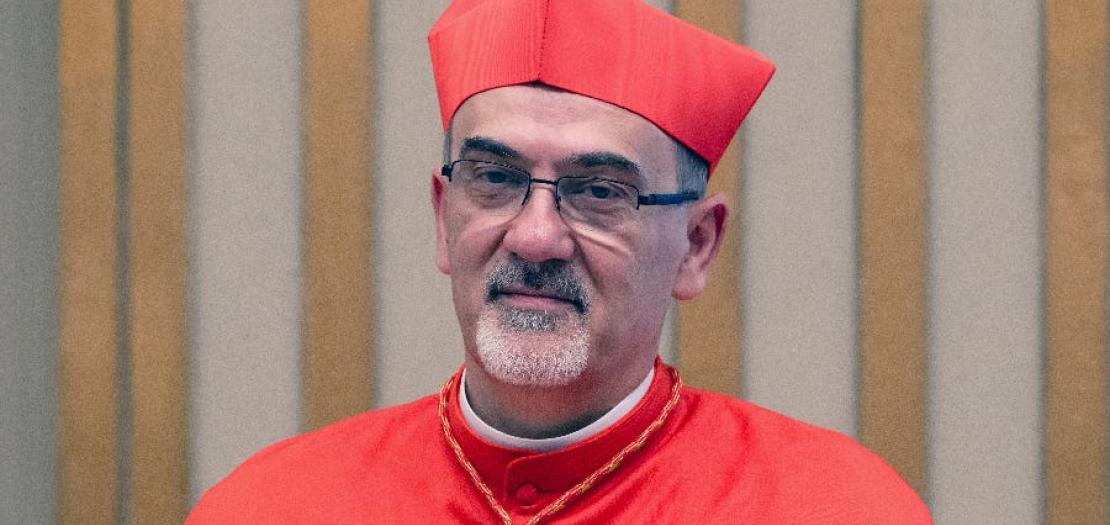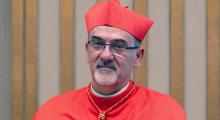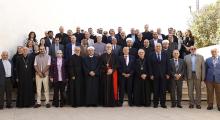Issued by the Catholic Center for Studies and Media - Jordan. Editor-in-chief Fr. Rif'at Bader - موقع أبونا abouna.org

Following is the text of the meditation by His Beatitude Cardinal Pierbattista Pizzaballa, Latin Patriarch of Jerusalem, on the 30th Sunday of Ordinary time, dated October 26, 2025:
A key to understanding today's Gospel passage (Luke 18:9-14) comes from two terms that revolve around the theme of righteousness, which we find at the beginning and end of the passage.
In the first verse, we see that Jesus immediately clarifies who the intended audience of the parable is: “those who were convinced of their own righteousness.” (Luke 18:9)
In the final verse, however, we learn that one of the two protagonists of the parable returns home justified, unlike the other. (Luke 18:9)
What does this mean? What kind of righteousness are we talking about? We could say that righteousness refers to the right relationship that human beings are called to have with God and with their brothers and sisters.
Now, the passage presents two opposing ways of thinking about what the right relationship with God should be.
The first is that of the Pharisee, who considers himself righteous because he does everything right, because he carefully observes the Law: God, I thank you that I am not like the rest of humanity --greedy, dishonest, adulterous -- or even like this tax collector. I fast twice a week, and I pay tithes on my whole income”. (Luke 18:11-12)
Unlike in other Gospel passages, here the Pharisee is not described as a hypocrite. He is sincerely religious and even does more than the Law prescribes. Thus, he feels good about himself, his conscience is at peace, and he can even consider himself better than others.
The tax collector, on the other hand, has nothing to boast about before God, and is fully aware that he is a sinner, with no merits to present to the Lord.
However, he has something that opens the door of mercy for him, something very precious and very rare: he is capable of not justifying himself.
Let us dwell for a moment on this attitude.
The tax collector, recognizing his sin, does not try to explain himself or defend his behavior. He does not minimize his mistakes, but stands before God as he is, without masks. He does not seek excuses, he does not compare himself to others, he does not absolve himself. He simply says, “O God, have mercy on me, a sinner”, that is, he stands before God in truth.
The truth of one who recognizes that only God is just, and that God, in His justice, welcomes every person, even the sinner. In God, mercy and justice are inseparable; they need each other. To do justice means to forgive.
The tax collector in the Gospel knows he is a sinner, but he does not fear that his sin might be an impediment to encountering the Lord, something to be kept hidden, something to justify.
This attitude is truly rare, because the attempt to justify oneself is the spontaneous reaction everyone has when they make a mistake. It has been this way since the first sin committed by Man (Gen 3:13), and it remains this way throughout human history, right up to the present day.
Well, in the Gospel stories we see that all those who do not prove themselves righteous are saved and justified, all those who place themselves totally in God's hands, trusting not in their own merits but in his goodness and justice, which is always merciful justice.
This is true of the sinful woman in Luke chapter 7. It is true of the good thief. (Luke 23:39-43)
This is true for all the little ones and the poor, who are saved not because they have merits with which to earn God's benevolence.
God does not ask us to justify ourselves, because He Himself wants to do so.
He Himself wants to re-establish the right relationship with us, which is that of children who know they need their Father and who place all their hope in Him.
And what about the Pharisee?
Paradoxically, his righteousness becomes his condemnation.
It is his condemnation because his thanksgiving is not true praise to God, but self-exaltation disguised as prayer and because, above all, it leads him to judge and despise others.
True righteousness, on the other hand, is a right relationship not only with God, but also with our brothers and sisters, that is, a relationship of mercy received and therefore shared, the awareness that we are all entering together into the feast of grace where God gives his forgiveness to all, freely. He gives it to all those who do not justify themselves.
+Pierbattista







